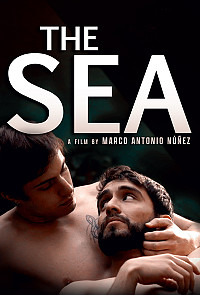| SHADOWS ON THE WALL | REVIEWS | NEWS | FESTIVAL | AWARDS | Q&A | ABOUT | TALKBACK | |||||||||||||
 Shadows off the beaten path Shadows off the beaten pathIndies, foreign, docs and shorts...
On this page:
BETWEEN TWO WORLDS |
PICKPOCKET |
THE SEA
| |||||||||||||
| See also: SHADOWS FILM FESTIVAL | Last update 29.May.22 | |||||||||||||
|
Between Two Worlds Ouistreham Review by Rich Cline | 
| |||||||||||||
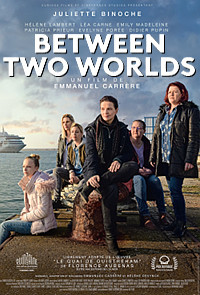 dir Emmanuel Carrere scr Emmanuel Carrere, Helene Devynck prd Olivier Delbosc, David Gauquie, Julien Deris with Juliette Binoche, Helene Lambert, Lea Carne, Didier Pupin, Evelyne Poree, Patricia Prieur, Emily Madeleine, Aude Ruyter, Arnaud Duval, Faical Zoua, Louis-Do de Lencquesaing, Charline Bourgeois-Tacquet release Fr 12.Jan.22, US Mar.22 sbiff, UK 27.May.22 21/France 1h46 CANNES FILM FEST  Is it streaming? |
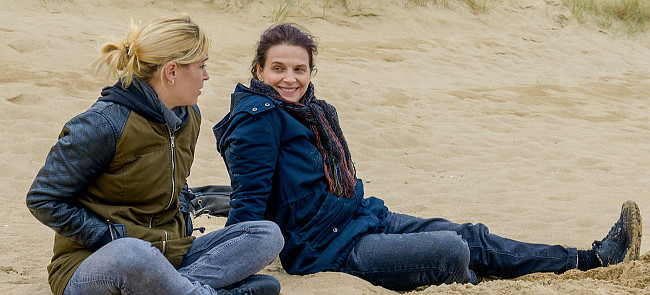 There are echoes of both Nomadland and Ken Loach in this pointed French drama, as filmmaker Emmanuel Carrere takes a deeply personal approach to how society fails its most vulnerable people. Set in the northern city of Caen, the film has a loose, documentary style that feels bracingly realistic, full of offbeat details and punchy anecdotes. And the intimate approach makes it an engaging, important look at insecure employment. Off the grid as a recently single housewife with no work experience, undercover journalist Marianne (Binoche) enters the unemployment system to learn firsthand about issues facing workers. Immediately patronised by government workers, she trains to be a cleaner and befriends others in her predicament, including the sparky Christele (Lambert), friendly Cedric (Pupin) and young Marilou (Carne). As others help her, Marianne pays it forward, building a tight bond with these people as they move from job to job, eventually cleaning cross-channel ferries. And Christele unknowingly becomes the key character in the book Marianne is writing. Marianne is often overwhelmed by the situation she discovers. Jobs offered are impossible, for example paying poverty wages but requiring that she has a car. Or demanding a deep house cleaning in just three hours. The work is complex and punishing, and she gets little respect. The hierarchy among overworked cleaners is appalling (men don't scrub toilets). And of course at the ferry port, crowds of refugees have it even worse. Each of the performances has an improvised edge, giving the film a gritty tone as it avoids both melodrama and sentimentality. Binoche is relaxed and luminescent as always, bringing out Marianne's compassion, humour and sharp sense of injustice. Her observations and feelings run very deep. She also has terrific chemistry with Lambert, whose Christele is a feisty woman who has learned to survive. And each person around them carries a strong sense of his or her own back-story. Aside from the premise and a few mini-adventures, there isn't much plot. Instead, the film is a collection of sequences that add colour and texture to the characters and the life they're living. This loose approach is a little uneven, as some sections are far more engaging than others, and the larger emotional thrust of the story sometimes gets lost on its way to a strong climactic moment. But the performances are so transparent that it's impossible not to care about these people. And their camaraderie in such a precarious position is inspiring.
| ||||||||||||
|
Pickpocket Review by Rich Cline |  MUST
MUST  SEE SEE
| |||||||||||||
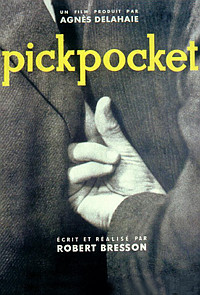 dir-scr Robert Bresson prd Agnes Delahaie with Martin LaSalle, Marika Green, Pierre Leymarie, Jean Pelegri, Dolly Scal, Kassagi, Pierre Etaix, Cesar Gattegno release Fr 16.Dec.59 restored UK 3.Jun.22 59/France 1h16 BERLIN FILM FEST VENICE FILM FEST Is it streaming? |
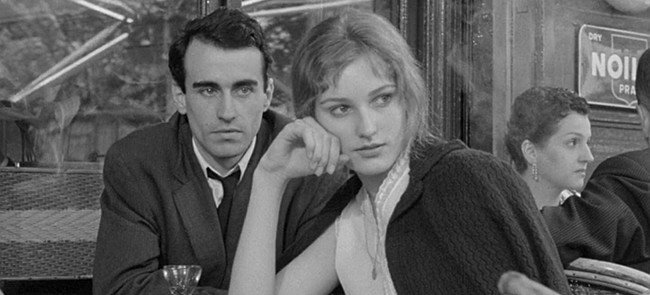 A French masterpiece, Robert Bresson's 1959 drama opens with a disclaimer noting that the film is not a thriller. But it's both seriously tense and infused with intense yearning as it follows a young man who is obsessed with stealing from unsuspecting people. Beautifully shot by Leonce-Henri Burel, with an eerily alert Martin LaSalle in his first role, this is a film that refuses to play by the rules. In Paris, Michel (LaSalle) lives in a grubby room and avoids visiting his sickly mother (Scal), although he likes her carer Jeanne (Green). Desperately poor, he decides to try pickpocketing and, after some trouble, begins to get the hang of it. He hones his craft with two veterans (Kassago and Etaix) and embarking on some elaborate sprees. Meanwhile, he debates his friend Jacques (Leymarie) and a police inspector (Pelegri) about the morality of stealing, depending on the motives of the thief. And while Jacques is distracted by Jeanne, the inspector has his eye on Michel. Bresson's direction features both bracing detail and a remarkably enticing sense of ambiguity. Several scenes are photographed in ways that leave key elements off-screen, stirring in innuendo while cleverly hinting at a number of other layers that are lurking in the story. In the slight-of-hand sequences, the camera features razor-sharp detail as it follows the gang's increasingly well-oiled process. Then when scenes swell up into more emotional encounters and confrontations, the feelings are both understated and vivid. Through all of this, Michel is going through his own existential crisis, wanting to improve himself in whatever way he can, even if this involves developing an illicit skill. LaSalle plays him with intense feelings, eager to help those he likes while coolly distancing himself from everyone else. after taking off for two years in Italy and England, his return to Paris is moving. His connections with Jeanne, Jacques and the inspector each carry a zing of subtext, hinting at different directions the story might take and sharply well-played by Green, Leymarie and Pelegri. Intriguingly, there's never the sense that Bresson believes Michel's arguments that his thieving has any moral value. But the filmmaker also refuses to pass judgment. This is a story about a young man who is lost, unable to make sense of the conflicting things he has learned throughout his life. Then when he has a bit of distance to grow up, he begins to realise what's important. It's seriously impressive thay Bresson never explains Michel's motives or lets him see the error of his ways. The film is much more complex and provocative than that.
| ||||||||||||
|
The Sea Al Mar Review by Rich Cline | 
Is it streaming?
| 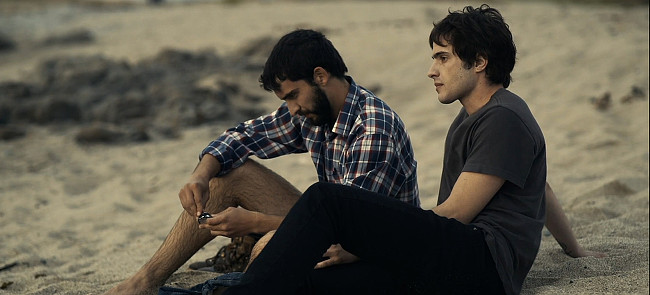 There's a dreamy, poetic vibe to this Chilean drama, which captures internalised feelings as it grapples with the nature of relationships and attraction. Filmmaker Marco Antonio Nunez shoots in a simple style that mixes documentary realism with soapy melodrama. This reveals the narrative in short clips that are knowingly edited together. The story is a slow burn, quietly spinning toward a confrontation that becomes increasingly inevitable. Lorena and Diego (Burgos and Gutierrez) are adjusting to their new life in a small coastal town, nervously starting new jobs as a baker and teacher, respectively. Separately, each of them meets the thoughtful young Vicente (Danobeitia), whose love of art is intriguing. Lorena asks him to participate in her filmmaking project, while Diego discovers a mutual attraction that makes it increasingly difficult to repress his homosexuality, which has always strained his marriage. So as Diego and Vicente develop their relationship in secret, it's clear that they can't hide it for long. Moving at a gentle pace, the film's writing and direction gradually deepen connections while exploring their interaction with the setting. Sequences are punctuated with a group of women fishing in the shallow surf, and locals regale Ana and Diego with knowing aphorisms about how the sea guides and echoes daily life. Things come to a head between these three characters on a camping trip as they discuss what love should look like, and if breaking the rules might make it better. Danobeitia has a superbly understated charisma, so it's easy to see why Lorena and Diego are drawn to Vicente. Burgos' Lorena has an introspective reaction, confused by the shift in mea marriage's dynamic as she seeks for bigger answers in nature. Gutierrez has a more difficult role as the confused Diego, afraid to let his real feelings come to the surface even though he knows he must. The way the three of them negotiate their relationship is beautifully underplayed. The film is written, directed and acted with an intimate that can't help but pull us in deeply. And our own stories will dictate which of these people we most closely identify with as we wait for the other shoe to drop between them. For much of the film, sex lurks as a possibility, and when it does emerge it's furtive, accompanied by vivid wave of tension. This adds a sharp edge to the film's depiction of various aspects of romance, even as it ends on a rather sudden but hopeful note.
| 
See also: SHADOWS FILM FESTIVAL © 2022 by Rich Cline, Shadows
on the Wall
HOME | REVIEWS | NEWS | FESTIVAL | AWARDS
| Q&A | ABOUT | TALKBACK | | ||||||||||


